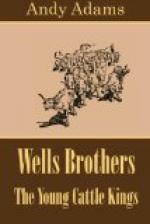“We were too poor,” frankly admitted the boy. “Every fall we had to go to the Solomon River to hunt work. With pa’s pension, and what we could earn, we held down the homestead. Last fall we proved up; pa’s service in the army counted on the residence required. It doesn’t matter now if we do leave it. All Dell and I have to do is to keep the taxes paid.”
“You would be doing wrong to leave this range,” said the trail boss in fatherly tones. “There’s a fortune in this grass, if you boys only had the cattle to eat it. Try and get a hundred cows on shares, or buy young steers on a credit.”
“Why, we have no money, and no one would credit boys,” ruefully replied Joel.
“You have something better than either credit or money,” frankly replied the cowman; “you control this range. Make that the basis of your beginning. All these cattle that are coming over the trail are hunting a market or a new owner. Convince any man that you have the range, and the cattle will be forthcoming to occupy it.”
“But we only hold a quarter-section of land,” replied the boy in his bewilderment.
“Good. Take possession of the range, occupy it with cattle, and every one will respect your prior right,” argued the practical man. “Range is being rapidly taken up in this western country. Here’s your chance. Water and grass, world without end.”
Joel was evidently embarrassed. Not that he questioned the older man’s advice, but the means to the end seemed totally lacking. The grind of poverty had been his constant companion, until he scarcely looked forward to any reprieve, and the castles being built and the domain surveyed at the present moment were vague and misty. “I don’t doubt your advice,” admitted the boy. “A man could do it, you could, but Dell and I had better return to the settlements. Mr. Quince will surely be well by fall.”
“Will you make me a promise?” frankly asked the cowman.
“I will,” eagerly replied the boy.
“After I leave to-morrow morning, then, tell Forrest that you are thinking of claiming Beaver Creek as a cattle range. Ask him if he knows any way to secure a few cows and yearlings with which to stock it. In the mean time, think it over yourself. Will you do that?”
“Y-e-s, I—I will,” admitted Joel, as if trapped into the promise.
“Of course you will. And ask him as if life and death depended on securing the cattle. Forrest has been a trail foreman and knows all the drovers and their men. He’s liable to remain with you until the season ends. Now, don’t fail to ask him.”
“Oh, I’ll ask him,” said Joel more cheerfully. “Did you say that control of a range was a basis on which to start a ranch, and that it had a value?”
“That’s it. Now you’re catching the idea. Lay hold and never lose sight of the fact that a range that will graze five to ten thousand cattle, the year round, is as good as money in the bank.”




